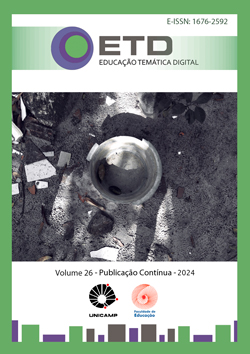Abstract
This research has as theme the literature available in the digital environment. The aim is to analyze virtual learning objects to promote reading available on the Internet, related to the reading of the literary. This investigation is qualitative, with a descriptive approach. The data collection instrument used were the descriptors: cyberliterature, digital reading, hypertext, literature in electronic media, digital literature, digital poetry, which were released on Google to carry out the survey of the virtual learning objects to promote reading. The sample type was non-probabilistic (intentional), since the criteria for choosing the data were elected by the researchers. The main theoretical contribution was Pereira (2019), Rocha and Amâncio (2021), Neitzel (2009), among others. As a result, it is indicated that the two virtual learning objects analyzed to promote reading, the self-programmed poem Árvore and the hypertextual novel Terminal, showed themselves to be predisposed to assembly and combine possibilities, with multiple textualities, when exploring the properties offered by the computer, giving the opportunity to great interpretive assortments and mobilizing differentiated perceptions of the reader about the literary writing and reading process itself. It is evidenced that both virtual objects can contribute to explore the aesthetic function of literature.
References
ANTÔNIO, Jorge Luiz. Poesia eletrônica: negociações com os processos digitais. Belo Horizonte: Veredas & Cenários, 2008.
ÁRVORE. Telepoesis, [s. l.], 2018. Disponível em: https://telepoesis.net/arvore/arvore.html. Acesso em: 13 jan. 2022.
BARTHES, Roland. O prazer do texto. Tradução J. Guinsburg. São Paulo: Perspectiva, 1993.
BARTHES, Roland. S/Z - uma análise da novela Sarrasine de Honoré de Balzac. Tradução Léa Novaes. Rio de Janeiro: Nova Fronteira, 1992.
BRASIL. Base Nacional Comum Curricular. Ensino Fundamental. Brasília: Ministério da Educação, Secretaria de Educação Básica, 2018.
BROCKMAN, R. John; HORTON, Willian; BROCK, Kevin. From debates to hypertext via electronic publishing: an information Odyssey. In: BARRET, Edward (org.). The Society of text: Hipertext, hypermedia, and the social construction of information. Massachusetts: Massachusetts Institute of Technology, 1989.
CALVINO, Italo. La galerie de nos ancêtres. Magazine Littéraire, Paris, n. 274, p. 34-38, fev. 1990.
CAMPOS, Haroldo de. Da tradução como criação e como crítica. In: CAMPOS, Haroldo de. (ed.). Metalinguagem & outras metas: ensaios de teoria e crítica literária. São Paulo: Perspectiva, 2004. p. 31-48.
CORDEIRO, Renato Medeiros. Poesia Digital: três leituras da obra de Jason Nelson. 2013. 119 f. Dissertação (Mestrado em Comunicação Midiática) – Universidade Federal do Rio Grande do Norte, Natal, 2013.
ECO, Umberto. Obra aberta. Tradução Giovanni Cutolo. São Paulo: Perspectiva, 1986.
GAINZA, Carolina. Código, lenguaje y estéticas en la literatura digital chilena. Perífrasis: Revista de Literatura, Teoría y Crítica, Bogotá, v. 10, n. 20, p. 117-130, jul./dez. 2019. DOI: https://doi.org/10.25025/perifrasis201910.20.06
GENETTE, Gérard. Palimpsestes: la littérature au second degré. Paris: Seuil, 1982.
GESSNER, Ricardo. Transcriação, transconceituação e poesia. Cadernos de Tradução, Florianópolis, v. 36, n. 2, p. 142-162, maio/ago. 2016. DOI: https://doi.org/10.5007/2175-7968.2016v36n2p142
KOMATSU, Flávio. Terminal – romance hipertextual. Terminal, [s. l.], 2017. Disponível em: https://t-e-r-m-i-n-a-l.blogspot.com/. Acesso em: 13 jan. 2022.
MOLANO PUENTES, Fredy Ulises; ALARCON-ALDANA, Andrea Catherine; CALLEJAS-CUERVO, Mauro. Guía para el análisis de calidad de objetos virtuales de aprendizaje para educación básica y media en colombia. Práxis & Saber, Tunja, v. 9, n. 21, p. 47-73, dez. 2018. DOI: https://doi.org/10.19053/22160159.v9.n21.2018.8923
NEITZEL, Adair de Aguiar. O jogo das construções hipertextuais. Florianópolis: UFSC; Itajaí: UNIVALI, 2009.
NEITZEL, Adair de Aguiar; BRIDON, Janete. Poesia digital: reflexões em curso. Literatura y Lingüística, Santiago, n. 27, p. 111-134, 2012. DOI: https://doi.org/10.4067/S0716-58112013000100007
NEITZEL, Adair de Aguiar; ESPÍNDOLA JÚNIOR, Geraldo de Jesus. O texto literário em meio digital: a formação de leitores pela ciberliteratura. Revista L.E.R, Rio de Janeiro, v. 8, n. 1, p. 47-64, 2018. Disponível em: https://www.sumarios.org/artigo/o-texto-liter%C3%A1rio-em-meio-digital-forma%C3%A7%C3%A3o-de-leitores-pela-ciberliteratura. Acesso em: 13 jan. 2022.
PEREIRA, Vinícius Carvalho. Do vegetal ao digital em Árvore, de Rui Torres. Texto Digital, Florianópolis, v. 15, n. 1, p. 137-157, 21 ago. 2019. DOI: https://doi.org/10.5007/1807-9288.2019v15n1p137
RAMOS JÚNIOR, José de Paula. Mário de Andrade e a lição do modernismo. Revista USP, São Paulo, n. 94, p. 49-58, jun./jul./ago. 2012. DOI: https://doi.org/10.11606/issn.2316-9036.v0i94p49-58
ROCHA, R. C.; AMÂNCIO, N. R. Navegar é (im)preciso: uma leitura do romance hipertextual Terminal. Acta Scientiarum. Language and Culture, v. 43, n. 1, e57401, p. 1-10, 9 abr. 2021. DOI: https://doi.org/10.4025/actascilangcult.v43i1.57401
RONDINI, Carina Alexandra; PEDRO, Ketilin Mayra; DUARTE, Cláudia dos Santos. Pandemia da Covid-19 e o ensino remoto emergencial: mudanças na prática pedagógica. Interfaces Científicas, Aracajú, v. 10, n. 1, p. 41-57, 2020. DOI: https://doi.org/10.17564/2316-3828.2020v10n1p41-57
ROSA, Bárbara Lopes da; DEBUS, Eliane Santana Dias. A literatura para infância em e-book: navegando pelo ciberespaço. Instrumento: Revista de Estudo e Pesquisa em Educação, Juiz de Fora, v. 22, n. 1, p. 154-170, jan./abr. 2020. DOI: https://doi.org/10.34019/1984-5499.2020.v22.30016
SOUSA, Guilherme Moés Ribeiro de; VIEIRA, Flaviano Maciel. Poesia digital e ensino: o letramento literário em uma perspectiva tecnológica. Signo, Santa Cruz do Sul, v. 43, n. 78, p. 55-67, set./dez. 2018. DOI: https://doi.org/10.17058/signo.v43i78.11991
TODOROV, Tzvetan. A literatura em perigo. Tradução Caio Meira. 9. ed. Rio de Janeiro: DIFEL, 2020.
ZAPATA LESMES, Clemencia; BONFANTE RODRÍGUEZ, María Clauda; SUÁREZ GARCÍA, María Cristina. Calidad de objetos virtuales de aprendizaje para el desarrollo de la inteligencia práctica en niños sordos. Hexágono Pedagógico, v. 4, n. 1, p. 2-26, 2013. DOI: https://doi.org/10.22519/2145888X.307

This work is licensed under a Creative Commons Attribution-NonCommercial-NoDerivatives 4.0 International License.
Copyright (c) 2024 ETD - Educação Temática Digital


